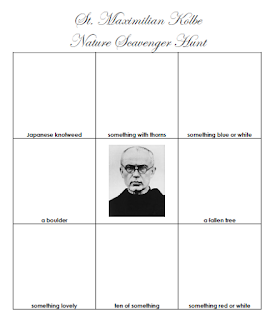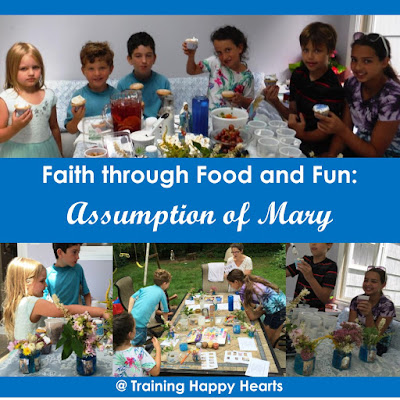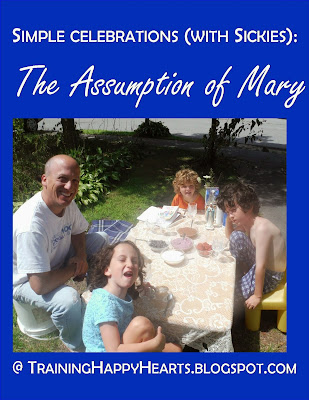{Disclosure: Some links which follow are affiliate ones.}
This year, I thought I would create a new FREE St. Maximilian Kolbe Nature Scavenger Hunt printable based mostly on St. Maximilian Kolbe's life as told in the Loyola Kids Book of Saints, which I plan to reread to my children before going on our nature walk.
In case you do not have time to get the book, however, I included a page of discussion points with the scavenger hunt so that you can easily retell parts of St. Maximilian's story on your own:
- Japanese knotweed: Father Maximilian started a Catholic magazine and newspaper that reached hundreds of thousands of people in just a few years. He, then, traveled to Japan to start another even though he spoke no Japanese. (If you do not have Japanese knotweed in your area, just cross this one out and put something else that might remind children of Japan or the far east in this box. Something hair-like: Fr. Maximilian grew a long beard before traveling as a missionary to Japan as a long beard was respected there at the time. Later, he has his beard shaved off and some of hi whiskers are now included in reliquaries.
- Something with thorns: In 1939, Nazi invaded Poland and began a thorny occupation. Because Fr. Maximilian was an outspoken priest, the Nazis wanted to shut down his popular magazines. So, they arrested and imprisoned him briefly in 1939. Then, in 1941, they arrested him again and sent him to Auschwitz in Poland, where he became prisoner # 16670 and later died.
- Something blue or white: In prison, Fr. Maximilian wore a blue and white uniform and lived in a large, cold building where he slept on a board.
- A boulder: Fr. Maximilian was forced to do hard – and sometimes horrifying - work, like carrying boulders, moving large trees, and carrying dead bodies to ovens where they would be burned.
- A fallen tree: Fr. Maximilian was starved and beaten in prison. Once, a guard strapped a plank to Maximilian’s back and made to run. When he collapsed, he was kicked and whipped.
- Something lovely: Despite hardships, Fr. Maximilian never stopped loving God or others. He persisted in prayer through sad, desperate situations and tried to help other prisoners.
- Ten of something: When a prisoner escaped, Nazi prison guards decided other prisoners would be punished to discourage other escape, so they selected 10 prisoners who would be starved to death.
- Something red or white: One of the prisoners cried out, “My poor wife and children! I will never see them again,” whereupon Fr. Maximilian said, “I would like to take the place of Sergeant Gajowniczek.” So, Fr. Maximilian and nine others were taken to a cell to starve to death. After several weeks, only four men – including Fr. Maximilian – remained alive. At this point, the Nazis gave them injections to kill them. Fr. Maximilian died on August 14, 1941 at age 47, a martyr pure in his love for God. This fulfilled a promise he had made Our Lady when he had a dream as a child in which she held out a red crown and a white one to him, asking him if he was willing to accept either of the crowns – the white one meaning he should persevere in purity and the red that he should become a martyr. He said he’d accept both.
- Saint Maximilian (free space): When Fr. Maximilian Kolbe was canonized a saint in 1982, an elderly Sergeant Goajowniczek, his wife, and his children were present in St. Peter’s Square. God’s love – as shown through St. Maximilian Kolbe – had saved his life. St. Maximilian put love before even his own life.
Also, as you can see in the discussion points, I have included an alternative for Japanese knotweed in case you don't have any in your area. In the FREE printable pdf, there is a second scavenger hunt sheet with this alternative on it.
In the boxes on the scavenger hunt, children can make a sketch or write a verbal description of what they found. You can see my Saint Anthony Nature Scavenger Hunt post to get a visual of how they might work.
More Liturgical Celebration Ideas for This Week
Click through any of the images or text below for my ideas and inspiration about St. Maximilian Kolbe and the Assumption of Our Lady (which is August 15.)
Our Assumption Day Tea – A Day Full of Moments of Grace
Planning an Assumption of Mary Tea: A Resource Round-Up
Assumption of Mary: No Cake Nor Juice Boxes, Just Some Drama
I'd love to see snapshots of your nature walk if you go on one. I also welcome your ideas for living the liturgical year with children.









